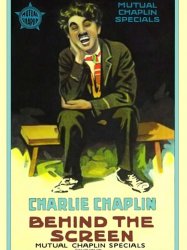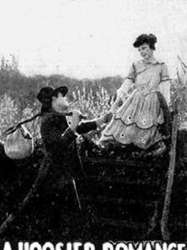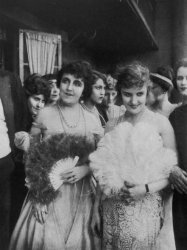Mutual Film

- Infos
- Best films
If you like this company, let us know!
Mutual Film Corporation was an early American motion picture conglomerate best remembered today as the producers of some of Charlie Chaplin's greatest comedies.
It originated with the partnership behind Western Film Exchange, founded in Milwaukee, Wisconsin in July 1906 by Wisconsin natives John R. Freuler (1872-1958), Harry E. Aitken (1877-1956) and Roy Aitken (1882-1976).
In 1910, Freuler would also form a partnership with Chicago film distributor Samuel S. Hutchinson known as the American Film Manufacturing Company.
It was early in 1912 when, with the Shallenberger brothers (Wilbert E. and William Edgar), Crawford Livingston, and others as investors, Charles J. Hite, the President & CEO of Thanhouser Film Corporation, joined John R. Freuler and Harry E. Aitken in the formation of Mutual Film. Hite eventually died in 1914.
As 1912 progressed, the company included auxiliary units such as Keystone Studios Comedies, the Majestic Studios (which would later become the Reliance-Majestic Studios through Harry Aitken's partnership with D. W. Griffith), and the New York Motion Picture Company. In 1915, the workers of Keystone Studios, Kay Bee Studios (a subsidiary of the New York Motion Picture Company) and Reliance-Majestic Studio left Mutual, along with the Aitken brothers, to form the Triangle Film Corporation. Now as complete owners of the former Reliance-Majestic Studio, by 1917 the conglomerate operated as the distributor for four subsidiary studios in California, three of which were in the Los Angeles area and the other in Santa Barbara. They were Signal Film Corporation, Vogue Films, Inc., Lone Star Film Company and American Film Company. Vogue Films, Inc. operated a studio at Santa Monica Boulevard and Gower street in Los Angeles producing two-reel comedy films exclusively.
In 1915, the United States Supreme Court ruled in Mutual Film Corporation v. Industrial Commission of Ohio that motion pictures were a form of business, not an art form, and therefore not covered by the First Amendment.
Shortly after this decision, cities began to pass ordinances banning the public exhibition of "immoral" films, concerning the major studios that state or federal regulations would soon follow. This ruling remained in effect until Joseph Burstyn, Inc v. Wilson in 1952 which declared that film was a legitimate artistic medium with free speech protections.
In 1916, Charlie Chaplin became the highest paid entertainer in the world when he signed a contract with Mutual for a salary of $670,000 per year. Mutual built Chaplin his very own studio and allowed him total freedom to make twelve two-reel films during this fruitful twelve-month period. Chaplin subsequently recognised this period of film-making as the most inventive and liberating of his career, although he also had concerns that the films produced were increasingly formulaic during the length of his contract.
During 1916 and 1917, the Lone Star Film Company had Charlie Chaplin working at their studio at 1025 Lillian Way, in Hollywood. Charlie Chaplin moved on to found United Artists in 1919 with Mary Pickford, D. W. Griffith, and Douglas Fairbanks. In 1919, Mutual Film Corporation ceased production. Like many other companies established at this time, Mutual was eventually absorbed by larger corporations, in this case Film Booking Offices of America and later RKO Radio Pictures.
With the exception of the Chaplin films, most of the Mutual shorts and feature dramas are lost to time and decompostion.
After a 53-year absence, MFC distributed one film, Tears of Happiness, in 1972.
Filmography of Mutual Film (181 films)
Production

The Count (1916)
, 23minutesDirected by Charlie Chaplin
Origin USA
Genres Comedy
Actors Charlie Chaplin, Edna Purviance, Eric Campbell, Leo White, Albert Austin, Henry Bergman
The tailor's handyman (played by Chaplin) burns a count's trousers while ironing them and is fired. His superior (Campbell) discovers a note explaining the count can't attend a party, and dresses up like one to take his place.

The Fireman (1916)
, 24minutesDirected by Charlie Chaplin
Origin USA
Genres Comedy
Themes Films about the labor movement, Disaster films
Actors Charlie Chaplin, Edna Purviance, Lloyd Bacon, Eric Campbell, Charlotte Mineau, Leo White
A young girl's father (Bacon) arranges with the local fire chief (Campbell) to have his house burn down so he could collect on the insurance money.

Behind the Screen (1916)
, 23minutesDirected by Charlie Chaplin
Origin USA
Genres Comedy, Romance
Actors Edna Purviance, Eric Campbell, Charlie Chaplin, Henry Bergman, Lloyd Bacon, Wesley Ruggles
The film takes place in a movie studio. A stagehand named David (Chaplin) has a supervisor, Goliath (Campbell). Much of the film is slapstick comedy involving Chaplin manhandling large props, but other plotlines include a strike by the stagehands, and Purviance, who is unable to become an actress, dressing as a man and becoming a stagehand.

One A.M. (1916)
, 22minutesDirected by Charlie Chaplin
Origin USA
Genres Comedy
Themes Films about alcoholism, Medical-themed films, Films about drugs
Actors Charlie Chaplin, Albert Austin
The film opens with a scene of a wealthy young man (Chaplin) arriving at his house in a taxi late at night after a night of heavy drinking. He struggles with the car door when exiting the car and then in paying the taxi driver (Albert Austin). When he gets to his front door, he thinks that he has forgotten the key and has to enter through the window. While climbing in through the window, he steps into a fishbowl that's placed underneath it and then almost falls down when the carpet underneath him slides. After finding his balance again, he goes through his pockets and realises that the key has been there all the while. He goes back through the window and enters through the front door.

The Rink (1916)
, 24minutesDirected by Charlie Chaplin
Origin USA
Genres Comedy
Themes Sports films
Actors Edna Purviance, Eric Campbell, James T. Kelley, Albert Austin, Charlie Chaplin, Henry Bergman
After amusements working in a restaurant, Charlie uses his lunch break to go roller skating.

The Life of General Villa (1914)
, 1h45Directed by Raoul Walsh, Christy Cabanne
Origin USA
Genres Biography, Documentary, Action, Adventure
Themes Political films
Actors Raoul Walsh, Teddy Sampson, Walter Long, Irene Hunt, Spottiswoode Aitken, W. E. Lawrence
Documentaire scénarisé sur la jeunesse de Pancho Villa.
Distribution

Beauty and the Rogue (1918)
Directed by Henry King
Origin USA
Genres Drama, Comedy, Comedy-drama, Crime
Actors Mary Miles Minter, Allan Forrest, George Periolat, Lucille Ward, Spottiswoode Aitken, Clarence Burton
As described in a film magazine, Roberta Lee (Minter), interested in uplift work, induces her father Thomas Lee (Periolat) to take on Bill Dorgan (Humphrey), a convict, as a gardener. Bill steels Roberta's jewelry the night she leaves on a vacation on a ranch, and he hides in the country not far from the ranch. Roberta meets Richard Van Stone (Forrest) and they become mutually attracted. Richard gives Roberta a broach that he had bought from Bill. When Roberta recognizes it as being hers and believes Richard guilty of the theft, she turns him over to the sheriff. Bill is later captured and Richard is released. Roberta learns that Richard is her father's new general manager, and she goes to tell him that she and Richard are engaged.

Powers That Prey (1918)
Directed by Henry King
Origin USA
Genres Drama, Comedy, Comedy-drama
Actors Mary Miles Minter, Harvey Clark, Allan Forrest, Clarence Burton, Lucille Ward, Perry Banks
Burton Grant exposes politician Jarvis McVey as a crook in a newspaper and is run out of town. He asks his daughter Sylvia to turn his job over to editor Frank Summers. Sylvia inherited her father's talents and decides to fire Frank and take over the newspaper herself. Meanwhile, Frank finds out McVey is involved in a scheme concerning the city franchise. When Sylvia is informed, she publishes the news. Soon, the towns people are after her and her father comes back to protect her against the outraged townsfolk, while Frank concerns about proving her reliability.

A Hoosier Romance (1918)
Directed by Colin Campbell
Origin USA
Genres Drama, Comedy
Actors Colleen Moore, Thomas Jefferson, Harry McCoy, Eugenie Besserer, Frank Hayes, Billy Jacobs
Pretty Patience Thompson, a "girl with a singing soul," lives with her cold-hearted and avaricious father, Jeff Thompson, on their Indiana farm. Her life of drudgery is brightened by John, the hired hand, but when he asks for her hand in marriage, the old man flies into a rage and discharges him. Soon an aged but wealthy widower courts Patience, and although she still loves John, "Old Jeff" orders her to marry the widower, claiming that a father's will is the law. Aware of her unhappiness, the kindly squire and his wife arrange for John to hide in the Thompson home on the day of the wedding. With all of the guests assembled, Patience runs from the room and pretends to escape on a horse, and while the two old men search the fields for her, she quietly marries John.

Charity Castle (1917)
Directed by Lloyd Ingraham
Origin USA
Genres Comedy-drama
Actors Mary Miles Minter, Allan Forrest, Eugenie Forde, Henry Arthur Barrows, Ashton Dearholt, Spottiswoode Aitken
As described in a film magazine, Merlin's (Forrest) father Simon Durand (Barrows) sends the son away from home because of his extravagance. The only condition upon which he can return is by presenting his first week's salary. The father then leaves to obtain a "water cure," and the servants go on vacation, leaving the mansion empty. After the death of the woman who takes care of his bachelor apartment, Merlin adopts her two children, Charity (Minter) and her younger brother known as the Prince (Callis). When numerous bill collectors come to the apartment for money Merlin owes them, Charity, who is a strong believer in fairy tales, decides to go the Merlin's father and see if he will relent and take his son back. When she and the Prince arrive at the mansion, they find it deserted and immediately take up their abode in the desolate building, which they start calling a castle, until the return of the owner. As their guests they invite Bill (Ahearn) the burglar, Sam (Russell) the bum, and Lucius Garrett (Aitken), an unemployed Shakespearean actor. When the elder Durand returns, he is furious and at first attempts to drive the intruders away, but then relents after Charity and the Prince win his heart and he gives the men employment on his estate. Merlin in the meantime has secured a position, and has endeavored to find the children but is unsuccessful. When he gets his first check, he goes to see his father, and the children are happy when son and father reconciled.

Her Country's Call (1917)
, 50minutesDirected by Lloyd Ingraham
Origin USA
Genres Drama
Themes Political films
Actors Mary Miles Minter, George Periolat, Allan Forrest, Henry Arthur Barrows, Margaret Shelby, Ashton Dearholt
Jess Slocum (Minter) is a mountain girl who was stolen as a baby by moonshiner Jim. She was raised to hate America, but is now taken in by Captain Earle Neville when Jim is sent to jail. Earle takes care of Jess, who is wounded, but she is afraid of her new surroundings and soon runs back to the mountain. On her way back, she overhears a group of Mexicans planning to destroy the nearby camp. She rushes back to warn them and is declared a hero. Jim confesses that Jess is the daughter of Confederate Army Colonel Tremaine. He had taken revenge on the Colonel when he was thrown out of the camp. Jess is reunited with her father and falls in love with Earle.

The Mate of the Sally Ann (1917)
, 50minutesDirected by Henry King
Origin USA
Genres Drama, Comedy, Comedy-drama
Actors Mary Miles Minter, George Periolat, Allan Forrest, Adele Farrington
Captain Ward is an old man living in a ship with his granddaughter Sally. Sally's mother died when Sally was born and never revealed the identity of her father. That is why Ward is overprotective of Sally, and he prays each day for the chance to slay the man who ruined his daughter and left a grandchild without a name. One day, Sally finds a three legged dog and sneaks him into the ship. He runs away, however, and Sally follows him to the mansion of Judge Gordon. There she meets Hugh Schuyler, the young friend of the judge. They fall in love, but Ward chases him away. The judge is struck by how much Sally looks like the woman to whom he was once married. When the judge visits the captain, he tells him he doubts he is Sally's father. Ward becomes angry and tries to kill him and Sally, interfering, is struck by a blow and knocked unconscious. When she awakes, Sally finds out that Judge Gordon is actually her father, having been secretly married to her mother. She accepts a marriage proposal from Hugh and elopes with him as they happily sail away along with the captain and judge.

Souls in Pawn (1917)
Directed by Henry King
Origin USA
Genres Drama
Themes Spy films
Actors Gail Kane, Douglas MacLean, Edward Peil Sr., Ashton Dearholt
As described in a film magazine review, Sebastian Dore (Dearholt) is mysteriously murdered in front of his home, and his beautiful wife Liane (Kane) vows revenge on the murderer. To this end she becomes a German spy for Karl, Prince von Kondermarck (MacLean), but the two fall in love. At the outbreak of war Karl is called to Germany, and Liane opens her home to wounded French soldiers. She accidentally learns that Karl is the murderer of her husband and plans to turn him over to the police. Before he leaves, Karl produces letters showing that Sebastian had betrayed his sister, and explains that Sebastian was accidentally shot in a struggle. Liane and Karl escape together on his yacht.

The Adventurer (1917)
, 24minutesDirected by Charlie Chaplin
Origin USA
Genres Comedy, Adventure
Actors Edna Purviance, Eric Campbell, Charlie Chaplin, Henry Bergman, Albert Austin, Monta Bell
Charlot, un prisonnier, réussit à échapper à la vigilance des gardiens de la prison. Il sauve ensuite une jeune femme et sa mère de la noyade en se faisant passer pour un millionnaire, et il est ensuite invité à la réception donnée en son honneur par les parents de la jeune fille. Pourtant, l'un des invités va reconnaître en lui le bagnard évadé. Une course-poursuite s'engage alors.

The Beautiful Adventure (1917)
Directed by Dell Henderson
Origin USA
Genres Drama
Themes Films based on plays
Actors Ann Murdock, David Powell, Edward Fielding, Kate Serjeantson, Edgar Norton
As described in a film magazine, Andre D'Eguzon (Powell) and Helen De Travillac (Murdock) are in love, but the mother of Andre, Countess D'Eguzon (Sergeantson), interferes and brings about the engagement of Helen to Valentine Borroyer (Norton), who makes a diary note of every event. On the morning of the wedding Andre goes to Helen and pleads with her not to marry Valentine. Helen tears off her wedding veil and flees with Andre to the home of her grandmother. They find themselves in many compromising situations as the grandmother believes that they are husband and wife. Helen gets Valentine to tell Andre's mother that he does not love Helen and that Helen and Andre should marry. And they do.
 Connection
Connection